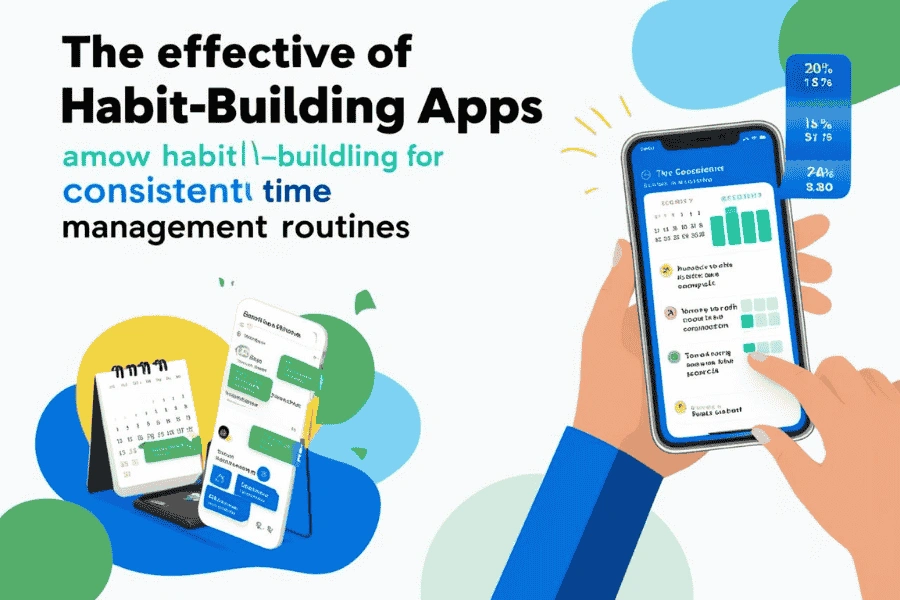Leveraging Habit-Building Apps for Consistent Time Management Routines
Introduction
In the modern world of competing responsibilities and constant distractions, developing consistent time management routines has become more important—and more challenging—than ever. While motivation and willpower play a role, lasting productivity is often built on small, repeatable actions that become habits over time. Habit-building apps are increasingly being recognized as powerful tools to help users create and maintain effective time management practices. By combining behavioral psychology with technology, these apps offer structured, supportive environments for habit formation that promote discipline, focus, and long-term consistency.

The Psychology Behind Habit Formation and Time Management
Before diving into the benefits of habit-building apps, it’s essential to understand the connection between habits and time management. Habits are automatic behaviors triggered by specific cues and reinforced by rewards. When good habits—such as starting the day with a to-do list, blocking out time for deep work, or regularly reviewing goals—are ingrained into daily routines, time management becomes almost effortless. Instead of having to consciously choose to be productive every day, individuals can rely on well-established patterns of behavior that save mental energy and reduce procrastination. This is where habit-building apps come in: they provide the structure, reminders, and feedback needed to support this behavioral transformation.
How Habit-Building Apps Support Time Management
Habit-building apps help users adopt and reinforce time management routines by offering a range of features grounded in behavioral science. First, these apps enable users to set clear, specific goals—such as "plan tomorrow’s tasks every night at 9 PM" or "limit social media use to 30 minutes daily." By breaking larger goals into smaller, manageable tasks, users are less likely to feel overwhelmed and more likely to follow through consistently. Second, most apps include reminders and notifications to prompt action at the right time. These cues help prevent forgetfulness and encourage the formation of habit loops. Over time, responding to these prompts becomes second nature, reducing the cognitive load associated with decision-making. Third, habit apps often include tracking and progress visualization features, which show users how many consecutive days they’ve maintained a routine. This visual reinforcement leverages the psychology of commitment and progress, motivating users to keep their streaks going and build long-term consistency.
Popular Habit-Building Apps for Time Management
There are several widely used habit-building apps that support time management, each with its own unique strengths. Habitica, for example, turns habit tracking into a game, where users earn points and rewards for completing tasks—ideal for those who enjoy a gamified approach. Streaks is known for its clean, minimalist interface and strong focus on maintaining habit streaks. Forest helps users stay off their phones by growing a virtual tree that flourishes the longer they stay focused. Toggl Track and RescueTime, while not habit apps in the traditional sense, provide detailed insights into time use, helping users recognize patterns and create new, more efficient habits based on real data.
Integrating Habit-Building Apps into Daily Lif
To successfully use habit-building apps for time management, users must integrate them thoughtfully into their routines. It’s important to start small—focusing on one or two key habits at a time rather than trying to overhaul an entire schedule overnight. Consistency is more important than intensity, especially in the early stages of habit formation. Choosing a fixed time of day and linking new habits to existing ones (such as reviewing a daily planner after breakfast) can increase the likelihood of success.
Benefits of Using Habit Apps for Time Optimization
The benefits of using habit-building apps for time management are numerous. They foster self-awareness by helping users understand where their time goes and which behaviors support or hinder their goals. They build accountability through daily reminders and visual tracking. They promote consistency and reduce reliance on willpower alone. Over time, users report reduced stress, improved focus, and a greater sense of control over their schedules and goals. Moreover, habit apps empower users to take a proactive, intentional approach to time, rather than reacting to daily demands. This shift from reactive to strategic time management leads to better results in both professional and personal life.
Challenges and Considerations
Despite their benefits, habit-building apps are not magic solutions. They require initial commitment and a willingness to self-reflect. Overuse or over-reliance on digital tools can also become a distraction. It's essential to use them as supportive aids, not replacements for discipline or purpose. Users must also be realistic with expectations—building effective time management habits is a gradual process, and setbacks are a natural part of growth.
Conclusion
Habit-building apps offer a powerful, technology-driven approach to mastering time management. By encouraging small, consistent actions and reinforcing progress, these tools help users transform daily behaviors into productive routines. Whether through gamification, personalized coaching, or data visualization, habit apps support the long-term development of skills that lead to lasting success. In a world where time is one of the most valuable resources, leveraging habit-building apps is a practical and effective way to reclaim control, increase productivity, and create a more balanced life.
Active Events
3 Essential Projects to Elevate Your 5c of Content Marketing Portfolio
Date: Aug 05, 2025 | 7:00 PM(IST)
7:00 PM(IST) - 8:10 PM(IST)
2432 people have registered
3 Must Have Projects On your CV to Get into Data Analysis
Date: Aug 05, 2025 | 7:00 PM(IST)
7:00 PM(IST) - 8:10 PM(IST)
2753 people have registered
Bootcamps
Digital Marketing Bootcamp
- Duration:4 Months
- Start Date:Aug 09, 2025
Data Science Bootcamp
- Duration:4 Months
- Start Date:Aug 09, 2025
